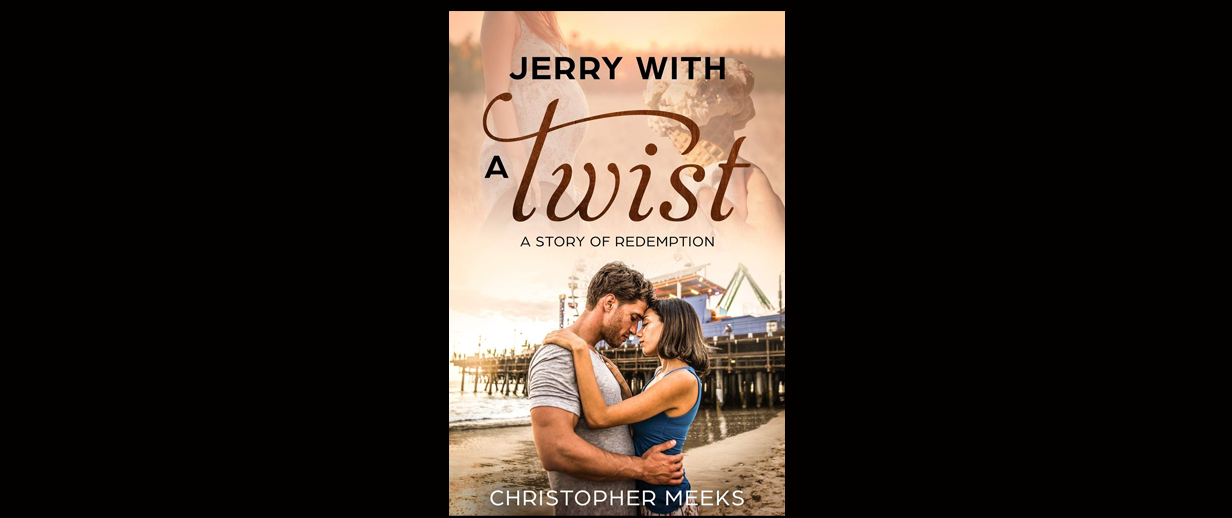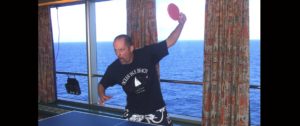
Jerry lay twisted on his bed as if God had turned him into a frog’s leg, ready to leap. He worried about many things— about their bills, about the birth of his son due in a few weeks—what if the boy comes out wrong or something?—and about the dent he made in his car door in a parking lot.
“Honey, you okay?” His girlfriend, Cheryl, shook him, and he groaned. “Wake up,” she said. “Time for your audition.”
The audition! Now he could worry about that.
He dressed in his serious casual clothes—khaki pants, loafers, and a long-sleeve pin-striped blue shirt—not the black—that he’d ironed the night before. One shouldn’t wear a suit for an audition unless perhaps it was for an elegant role, such as the psychiatrist in Equus or C.S. Lewis in Shadowlands, both of which he’d performed in college. One couldn’t be in long shorts and sandals, unless it was for a teenage boy, which he no longer was.
“I have a feeling you’ll get it,” said Cheryl in the kitchen at the drippy sink. He still had to fix that stupid thing. The landlord should, but he knew the landlord wouldn’t, not with the stabilized Santa Monica rent. He’d learned that with the broken toilet. Jerry just wanted to—errrrr!— make it already, get away from broken anythings, and grab his life.
“I’m off,” he said.
“Without your breakfast burrito?” Cheryl pointed to the one she made with scrambled eggs, fresh parsley, and hash browns, just the way he liked. It seemed she was making up for their recent lack of intimacy through food. She had spotted last month, and they freaked out, thinking it was a miscarriage. The doctor said everything was fine but no more sex until after the birth. He missed their time together—just one more thing making him tense these days. Still, her health was everything, even if she looked so sexy and swollen in her blue robe, her hair slightly askew—but he’d wait.
He ate half his burrito. “I just gotta go.” “Okay,” she said. “Know that I believe in you.”
He smiled as best he could, but once out of the apartment, he shook his head. She “believed in him.” That wasn’t enough to quell another huge worry: how much longer could he endure his dead-end job at Office Max? His boss, Stacy, always let him take time off for auditions, but she told him recently she wanted to promote him to assistant manager, replacing the last one who gave his notice by yelling at the front door, “I quit this fucking place!”
“A promotion means more devotion,” she said. “I need you. Actors out here are more plentiful than our pens.”
He liked their Tūl pens, the blue, not the black.
Stacy also said, “And no more New Zealand accent. It creeps me out.”
“It’s good, though,” he said in his down-under accent. “Recently some New Zealanders asked me where I was from. I said Auckland, though I’ve never been below the equator in my life.”
“So you’re good. How’s it help me?”
“People remember me,” he said, back to normal. “It’s good for business.”
She considered, nodded, and said, “Okay. What the heck. I like you. Plus you have a business mind. I want to make this the number one store in L.A. So you’ll do it?”
“Let me think about it,” he said, praying that he’d get his break soon, five years out of college. While a promotion might at least let him match Cheryl’s income as a receptionist at St. John’s hospital, he wanted to be an actor. He was born to act. That and a Tūl pen was worth about a buck.
He’d made a name for himself in Los Angeles 99-seat theatres, which supposedly led to bigger and well-paying gigs. Still, great notices in the L.A. Weekly for his roles in Chekhov’s The Seagull and Ronald Ribman’s Cold Storage and a great review in the Los Angeles Times for David Rabe’s Hurlyburly got him precisely nowhere. He was paid five dollars a performance because these little theatres barely squeaked by. No movie producers called him up. Rather, his agent pushed him for this commercial. If he didn’t get this, he’d probably lose his agent.
In a building much closer than the Santa Monica office park where all the studio stuff was, he studied the script he was given before the audition, sharing a waiting room with three other actors. One was a balding, hefty guy in his fifties with a gray beard and round, black glasses. He looked confident, glanced at his script, and then soon read an old People from the coffee table.
“I’ve seen you somewhere,” Jerry told the man. He hadn’t, but it was a great way to get an actor talking.
“I doubt you have,” said the man. “I’ve been a graphic artist most of my life and only discovered acting recently. A casting agent saw me singing in a barbershop quartet. She suggested I test for her, and it worked out.”
“As easy as that?” said Jerry.
“At first acting was a whim, but I needed a life change. It’s been great. I’ve shot four commercials this month, and soon they’ll be airing.”
“But no plays or films?”
“I’ve been cast for an indie. We’ll see how that goes.”
The other guy was more Jerry’s age, taller, handsomer, but as he was reading, squinting as if he needed glasses, his lips moved. He was the first in, and within minutes he came out and told Jerry, “They want to see you.” The actor looked sad. He must have flubbed it somehow.
Jerry walked in knowing the audition really started at the door. He had to appear as if this were fun, like going into Victoria’s Secret last year with Cheryl and picking out revealing nighties—which is probably what led to impassioned congress in the parking garage and her accidentally getting pregnant. The room featured a long folding table with a man in his mid-thirties sitting at the center, looking neither exhausted nor welcoming. That had to be the director. Two slightly older women flanked him, one of whom looked pleased. That happy person had to be the casting agent, Lonnie Weintraub, who’d suggested his audition after his agent called her. Jerry’s headshot lay before the man. Two leather easy chairs stood in front of the table, and in one sat a young woman in her twenties with lipstick as red as a fire hydrant and an innocent Anne Hathaway smile.
“I’m Roger Bennett, the director,” said the man. “This is Lonnie—”, pointing to his left, “—and my assistant Bernadette,” pointing to his right. The director nodded toward the young woman in the chair near Jerry, saying, “And Holly Oatfield is our leading lady.”
Holly extended her hand and said, “Pleased to meet you. I saw you in Hurlyburly a few years ago somewhere in the Valley.”
“Oh, yeah. That was fun. Glad you could make it.”
“You were great,” she said, and her eyes meant it. She was rather sexy, too, two buttons on her white blouse undone. He didn’t know her, but what a great way for an audition to start.
“Have a seat,” said the director. “Mind if I ask you a few questions?”
“Go ahead.”
“You’ve had some great parts,” said Roger. “A little young for Willy Loman—”
“That’s college but—”
“And some more substantial roles in L.A. theatre including the Rabe play.”
“Thanks.”
“But it doesn’t look like a lot of film work.”
“I did take Seymour Brown’s ‘Acting for the Camera’ class last year. I’m totally comfortable in front of a camera.” He didn’t say that he had hoped for a feature film to start, maybe Spiderman’s brother or some other superhero thing that would elevate his status. Still, this little piece of poo thing was a step forward. It didn’t take a lot of great acting.
“Any questions about the role?” said the director.
“I’m her boyfriend,” said Jerry, indicating the young lady.
Jerry knew, though, you should always have a question to show your interest and to get interactive, so he asked, “About my last line?”
“Yes?” said the director.
The women looked at their scripts. Lonnie said, “Tampons?”
“Is that the way I say it, as if I didn’t know what they were? Or is it more like ‘Tampons?’ as if it’s the last thing in the world I expected?”
The director smiled. “It’s just a Target commercial,” he said. “Don’t read into it too deeply. It’s just supposed to be funny.”
“Ah, like, tampons! What flavor?”
The man laughed, but all the women cringed. “Sorry,” Jerry said, and breaking into his New Zealand accent, “I’m bloody sorry. Drinkin’ too much Steinlager.”
Now everyone looked confused.
“Let’s do a run-through,” said the director.
He and Holly started, and, staying in his normal voice, he quickly felt the part of Holly’s boyfriend. Ostensibly, they were shopping in a Target store, and every item she asked him for seemed suggestive. They performed, smoldering, steaming. She stared right into his eyes. If subtext were aluminum siding, they were cladding a castle. He came to the last line. “Tampons,” he said, not as a question, but as proof of his loyalty.
The director and two women all looked at each other, surprised.
“That was…” said the director. “Yes, it’s…” said Lonnie.
“Hot” said the assistant, but the director looked puzzled. He gazed at the script a moment as if trying to understand something. Then he barely glanced at Jerry and said, “Thanks. We’ll call you.”
“Thank you,” said Jerry, knowing nobody ever called.
The director hadn’t shouted, “Loved it!” or “You nailed it” or “We’ll call your agent within the hour—you’re it.” What happened? Holly held out her hand. He shook and could feel a piece of paper go into his palm.
“Nice meeting you all,” said Jerry, and he stepped out, trying to appear as sure of himself as he could.
“Tell the last guy he can come in,” said the director.
Once he was in the hallway, he checked his palm. A little slip of paper had the words, “Hang around. We can have coffee after the next guy.” He smiled. At least he wowed Holly. He felt instantly guilty. His girlfriend was pregnant, yet he’d been excited about this young woman. Not good. Then again, it could be innocent. Just coffee. Get away from the tension.
Jerry turned to the bald, bearded fellow and said, “They asked for you to go in.”
“Thanks,” said the guy, who got up and walked as if popping into a jelly bean store.
Why would the director even consider that old dude? The old man couldn’t be her boyfriend. Maybe he was the perverted Uncle who lived in the basement, ready to drag his niece downstairs by the hair. Quite soon, however, laughter erupted from the room, male and female together. Jerry moved closer to listen. The last line came as if tampons were a newly discovered engineering feat. The director clapped as said, “You nailed it.”
What’s wrong with the director? Didn’t he have eyes?
Jerry felt defeated, like a crayon abandoned on a hot sidewalk. He left. He didn’t want to deal with Holly. One woman was enough.
As he slinked to his car, he considered what a betrayal having his talent was. In middle school, his teachers had understood his gift, and he nabbed the leads in the plays. High school and college pushed him farther. He had voice lessons and learned sound and light design and even directing. After his BFA in theatre, Los Angeles brought him some great plays to perform. Now he realized life can show you that you’re good at something, then crushes you when other people with less talent, less focus, scoot ahead.
For him, acting was about revealing truth, and he thought he’d done that in his scene with Holly. Still, he didn’t really want to sell products, and that probably showed. Is that what life was, convincing people to buy stuff they didn’t need? Buy and then you die? He wanted to act to encourage people that life was worth living. What a joke that really was, though.
Now it wasn’t worth living.
When he arrived at his car, an eighteen-year-old Chrysler Sebring convertible—something sporty that he had before he met Cheryl but it needed a paint job the way the West needed water—it did not start. Little click sounds came from the engine. It was either the battery or something really expensive in the electrical system. Errrr!
His phone was a brick—no charge. He needed to walk two miles toward home. Soon he spotted a young woman on roller skates and just a bikini and headphones, dance skating down the sidewalk toward the pier. This happened as he stepped off the curb, and not only did he twist his ankle, he fell into a muddy curbside stream of water. He shouted. “Hell! We’re in a drought!” as if he could get other citizens outraged at illegal water wasting.
As he stood up, the side of his khakis and his blue shirt were now all muddy. As he tried to brush it off, he only smeared and made it worse. He limped toward home.
“Five dollars,” said some scraggily bearded homeless man whose shorts and button-down shirt still looked neater than his.
“Like I’ve got five dollars just hanging around!” said Jerry perhaps too angrily.
“Sorry,” said the man. “I just thought you could use it.”
The man slapped five dollars into Jerry’s palm, the same one that had held Holly’s note earlier that hour. The man stepped to his green Jaguar. Ah, so I’m the homeless man, thought Jerry. Frickin’ day.
In the next block, Jerry limped down the pier to an old- fashioned ice-cream stand he knew. He needed just one good thing.
As he stood in line, he heard, “Jerry? Jerry, is that you?” in a sexy husky voice he knew too well, even though he hadn’t heard it in five years.
He turned to see Rosa, the first girlfriend he’d had in Los Angeles after he’d returned from college in Denver. She’d had a car when he didn’t. At the time, she also had a bank account, a job, and great clothes, all the things he didn’t have. She saw him perform in David Mamet’s Sexual Perversity in Chicago, and they’d become a little perverse that same night. Now, her cascading dark blond hair acted as parentheses to her bright smile and the curves of her low-cut dress. She’d grown even more beautiful since he last saw her. Her silver necklace showed the elegance she’d always had, and she licked mint chip ice cream on an old-fashioned cone with that wonderful tongue of hers.
“Rosa,” he said, realizing too late that he revealed his one muddy edge.
“Wow,” she said half-frowning, half-laughing.
“Just had a strange accident up there,” he said, pointing up the pier to the road.
“Are you okay?”
She held onto the hand of a thin four-year-old boy. In his other hand, his left, the boy grasped a chocolate cone that dripped over his fingers. He moved behind his mother’s purple print skirt and looked at Jerry warily.
“Oh,” said Jerry, looking more closely, noticing the boy with longish blond hair had the same infuriating cowlick on his crown as he had had as a kid, like an exploding dandelion. Now that Jerry thought of it, the kid had the same quizzical expression he’d had in a photo his mother used to keep.
“This is Jeremiah,” said Rosa.
Jeremiah? Jerry calculated. Maybe she’d stop taking the pill then. Is that why she was here? What was going on? Stay cool, stay cool.
“Hi, I’m Gerald,” said Jerry, bending down, wanting to emphasize their names were really different. Jerry held out his hand to Jeremiah. The kid reached with his drippy left hand as if to pass off the cone. Jerry, too, was left-handed.
“No, that’s okay. You keep it. It looks good.” The kid licked with delight.
Jerry straightened up. “So are you married?” he asked Rosa.
“I was,” she said, “to his father, a film producer.” She gave a name he recognized. That guy was old—or he had been until he’d died last year. In fact, he knew the man had lived north of Montana Avenue, the really rich area that butted up against the Riviera Country Club.
“Sorry to hear of his passing,” said Jerry.
“Circle of life,” she said, finishing the last of her own cone with a bite. She crunched and swallowed. “And you’re married.” It was a statement as she pointed to the ring on his left hand.
“Technically we’re not, but we gave each other rings, and Cheryl is due with our first baby next month.” He smiled, thinking about it. He realized her pregnancy was such a pleasant picture, he might use the memory in acting. Like Marlon Brando, he believed in method acting, first popularized by Stanislavski in Russia—the same man who’d directed and performed in Chekhov’s The Seagull in the play’s first great production in 1898 in Moscow. Jerry always researched his roles deeply.
“You’ll like fatherhood,” Rosa said. “I always thought you’d make a good dad if you could only get serious.”
“I got serious.” “Still acting?”
He remembered her attitude now. She always thought he’d “get real” and put aside acting as one did croquet or badminton. He sighed. “I don’t know if I’ll keep acting.”
Right then, little Jeremiah’s chocolate scoop hit the ground, splatting partially on one of his green sneakers. His face immediately registered his horror.
“It’s okay, it’s okay,” said Rosa, kneeling down to her son, racing in with a napkin from her purse. “Shhh,” she told him assuredly, and Jerry couldn’t tell if little Jeremiah would cry or not. He was right on the edge.
Jerry said, “It’s okay.”
She expertly scooped up the remaining ice cream and deftly tossed it in the nearby trash can. She then wiped off the brown from boy’s shoe. “How about we walk down to the beach? You can wash your hands in the surf. How’s that?”
The boy smiled and dashed for the staircase down to the beach.
“Jeremiah!” she screamed. “You wait for me.” The boy stopped, antsy.
“Good to see you,” said Rosa to Jerry, and then she and her boy raced off.
She’d been fun and funny when he knew her—but she didn’t believe in his dream. She’d wanted him to move in— and more, he knew. At the time, he couldn’t support her nor fit into her mold, and he knew he had to focus on his career. He’d told her they had “no more magic”—a line from the Mamet play. He’d been callous, he now realized. Still, things seemed to have worked out for her.
Jerry twisted back to the ice cream line, managing to step on the exact spot where Jeremiah had lost his scoop of chocolate. As he slipped and fell, Jerry knew he was under some kind of curse. He landed hard on his butt, and he thought he heard a crack.
A half-hour later, he limped onto the lawn of his apartment complex that overlooked Santa Monica Bay. Would he be okay for work tomorrow? Should he go to the doctor?
Should he take the promotion? Was it time to give up acting?
He sat on the grass. Exhausted, he lay down and stared up at the clouds. Normally, the sky would be completely blue or completely cloudy—the marine layer, as Fritz the weatherman called it. The marine layer would burn away to show the blue. Today, however, small sharp clouds like daggers hung over him.
People don’t get what they want, Jerry realized. That’s why celebrities are celebrated—they’re the few to get their dreams. When they do something human—stupid or bad like
Lindsay Lohan or Bill Cosby—we hate them and cheer. We’re glad for it. Let them feel what the rest of us feel: what it’s like to not get what’s wanted.
Except Cheryl did. She got pregnant.
At the screech of a seagull, he turned his head to watch it alight on a lamppost. Above the gull, more than a dozen white birds flew. Doves, he thought. They seemed like a pod of angels, swooping around in a circle-8 pattern, in and out of the palm trees, flight as regular as a pendulum. They were one unit, and when they curved one way, they became gray pixels. These birds did what they were meant to do. As the doves swooped around, the sunlight caught them, and for a moment, they were an arrowhead, all white. Wordless.
Wonderful. He’d seen them before. One of his neighbors, he suspected, had raised them.
He wasn’t ready to go upstairs and tell Cheryl everything that’d happened to him. He’d stay. Was this the moment that someone running with scissors would trip in an apartment above, and the scissors would sail out the window and land in his chest? So be it. The sun felt warm on his face, and he closed his eyes.
Minutes later, he felt the sun go out. Panicked, he opened his eyes to see the silhouette of a woman above him. The woman had an aura around her shoulder-length hair, hair he knew and often smelled and intertwined with kisses. He also recognized the posture and the arc of pregnancy.
“Cheryl,” he said. “You’re back from the store?” “Yeah,” she said. “You okay?”
“Why wouldn’t I be?”
“I got you Thomas’s English muffins. I know you wanted Bay’s, but they were out.”
“You can’t always get what you want.”
She nodded, mumbling “Rolling Stones,” and sat next to him as if to reassure him he’d be okay. Women were good at that kind of thing. He wasn’t sure what men were good at.
Probably nothing unless you were old and gray-bearded and took acting on a whim. He flashed on the end of a performance he saw recently of Arthur Miller’s final play, The Price, which was hardly ever produced but should be. In the play, two brothers, a doctor and a policeman, wrangle over what to do with the furniture they just inherited and the price for it. They argue, thanks to a lack of connection over the years. Even though the poorer brother, the policeman, doesn’t reconnect with his brother, the policeman seems unusually upbeat in the end and reconnects with his wife. It’s there in the subtext. The man knows there’s nothing he can do but enjoy what he has.
Cheryl placed Jerry’s hand on her belly. He felt movement, a kind of twisting. This was a funny kind of life.
Also read James Victor Jordan’s Review of JERRY WITH A TWIST, A STORY OF REDEMPTION
Read Christopher Meeks’s Guest Blog
Read James Victor Jordan’s Review of Christopher Meeks’s JONI PAREDES
Read James Victor Jordan’s Review of Christopher Meeks’s MONTHS AND SEASONS
Get up close and personal as James Victor Jordan interviews Christopher Meeks





Pingback: Review of The Benefits Of Breathing-Christopher Meeks-James V Jordan